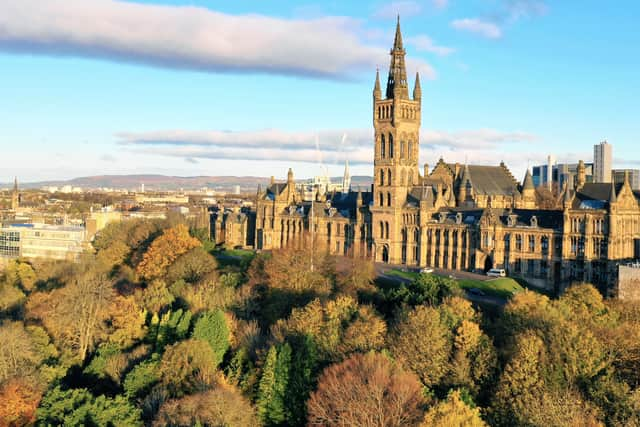Glasgow record temperature: what is hottest weather ever recorded in city - how does it compare to UK record?
and live on Freeview channel 276
Most places across the UK currently have a red or amber weather warning in place from The Met Office for extreme heat.
Glasgow currently has an amber weather warning in place until midnight tonight (19 July).
Advertisement
Hide AdAdvertisement
Hide AdSo what is the hottest temperature ever recorded in Glasgow?
Here’s everything you need to know.


What is a heatwave?
According to the Met Office, for a heatwave to be declared a threshold must be met.
The UK heatwave threshold is described on the Met Office website as: “when a location records a period of at least three consecutive days with daily maximum temperatures meeting or exceeding the heatwave temperature threshold.”
The initial heatwave thresholds were calculated based on the 1981-2010 climatology of daily maximum temperature at the midpoint of the meteorological summer (15 July). In 2022, the Met Office updated the threshold.
Advertisement
Hide AdAdvertisement
Hide AdThe threshold for a heatwave temperature differs by county, with some areas in the southeast having a threshold of 28°C, while areas to the north and west have a threshold of 25°C.
What is the hottest temperature recorded in Glasgow?
Glasgow’s hottest day ever recorded was in 2018 when temperatures reached 31.9°C.
What is the hottest temperature recorded in the UK?
On Tuesday 19 July 2022 the UK broke its record for the hottest temperature ever recorded when temperatures at Heathrow reached 40.2°C.
Before that the hottest temperature ever recorded for the UK was 38.7°C from 2019.
What does an amber warning for extreme heat mean?
Advertisement
Hide AdAdvertisement
Hide AdThe current amber warning in place states that people can expect the following:
- Adverse health effects are likely to be experienced by those vulnerable to extreme heat. Government advice is that 999 services in emergencies only; seek advice from 11 if you need non-emergency health advice.
- The wider population are likely to experience some adverse health effects including sunburn or heat exhaustion (dehydration, nausea, fatigue) and other heart related illnesses.
- Some changes in working practices and daily routines are likely to be required.
- An increased chance that some heat-sensitive systems and equipment may fail, potentially leading to localised power cuts and the loss of other services to some homes and businesses.
- More people are likely to visit coastal areas, lakes and rivers leading to an increased risk of water safety incidents.
- Some delays to road, rail and air travel are possible, with potential for welfare issues for those who experience prolonged delays.
How to stay cool in a heatwave?
The government has addressed the amber warnings in place across Scotland and offered helpful tips for managing the heat.
Justice Secretary Keith Brown, lead Minister for resilience, said: “when temperatures increase, it’s important to monitor forecasts and follow public health advice, including staying hydrated and drinking plenty of fluids and avoiding excess alcohol.
“I would also urge people to look out for vulnerable family, friends and neighbours, as older people, those with underlying conditions and those living alone may struggle to keep cool and hydrated.”
Advertisement
Hide AdAdvertisement
Hide AdThe Met Office has a list of tips on their website, as well as on the government website that will help people stay cool in the extreme weather.
For guidance people should:
- stay indoors or shaded when the sun is at its hottest (11am - 3pm)
- drink plenty of cool fluids throughout the day
- eat cold foods with high water content such as salads and fruit
- take a cool shower, bath or body wash
- sprinkle water over skin or clothing, or keep a damp cloth on the back of your neck
- avoid alcohol – which can leave you dehydrated
- avoid extreme physical exertion
Comment Guidelines
National World encourages reader discussion on our stories. User feedback, insights and back-and-forth exchanges add a rich layer of context to reporting. Please review our Community Guidelines before commenting.
